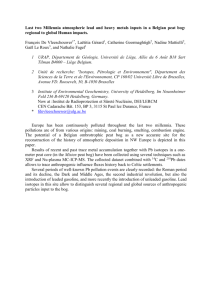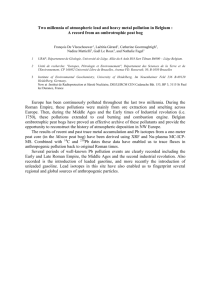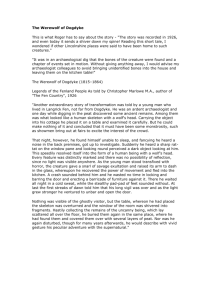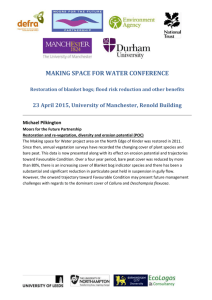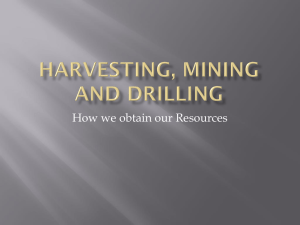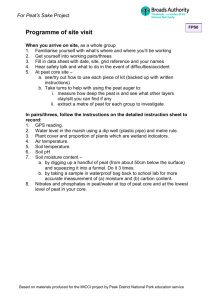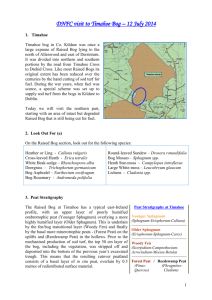Thawing of Permafrost Peatland and Hydrological Implications Masaki Hayashi , Bill Quinton
advertisement
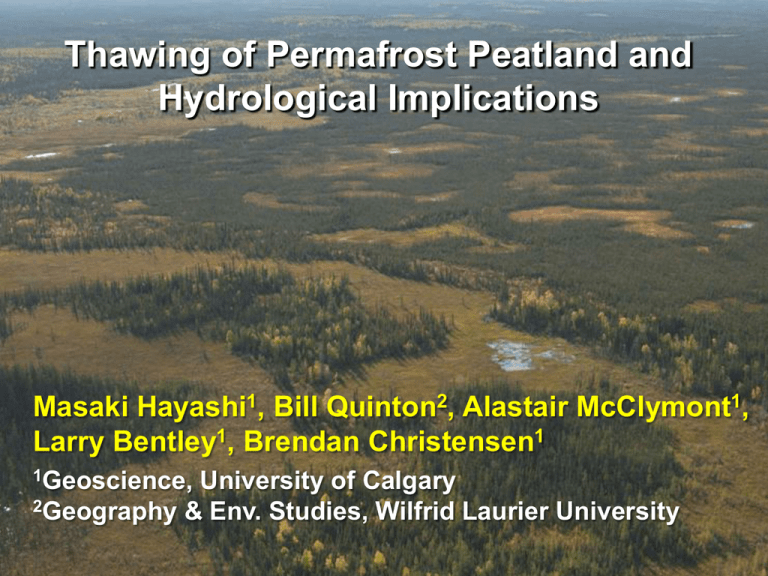
Thawing of Permafrost Peatland and Hydrological Implications Masaki Hayashi1, Bill Quinton2, Alastair McClymont1, Larry Bentley1, Brendan Christensen1 1Geoscience, University of Calgary 2Geography & Env. Studies, Wilfrid Laurier University Prediction of Permafrost Thaw, 1990-2090 Scotty Creek Hay River Lowland Model Assumptions • Vertical energy transfer • Large (50 km) grids • No lateral flow of water and energy Reality (Scotty Creek) pink: complete thawing Zhang et al. (2008.lake Geophys. Res. Lett., 35: L02502) peat plateau isolated bog connected bog channel fen 1 km Annual Total Basin Runoff near Ft. Simpson precipitation (mm) annual runoff (mm) Four Rivers (150-1,900 km2), Similar Landcovers 400 300 200 Birch Jean-Marie Blackstone Scotty Runoff = Total flow / Drainage area 100 0 1970 1980 1990 2000 2010 Ft. Simpson precip. 600 400 200 0 1970 1980 1990 2000 2010 flat bog peat plateau channel fen Peat Plateaus Have Permafrost Cores channel fen Water flows over frozen peat. bog permafrost Frost Table in Late August 2006 GS: ground surface FT: frost table relative elevation (m) 1 ground surf. 0.5 0.5 m 0 0.9 m -0.5 frost table -1 -1.5 0 10 20 30 distance from fen (m) 40 Differential Thawing by Conduction 0.5 ground srf. zf l (W m-1 K-1) T = Ts Qm T=0 frost table Conduction dominates heat flux. Qm = lb (Ts – 0) / zf 0.4 0.3 0.2 0.1 Measured de Vries Eqn. 0.4 0.5 0.6 0.7 0.8 lb : bulk thermal conductivity water content Wet spots thaw faster. Hayashi et al. (2007, Hydrol. Proces. 21: 2610-2622) 2D Survey of Frost Table (FT) June 12, 2006 ground surf. FT • FT measured using FT probe on 0.25 m grids. • Subsurface flow simulation: 15 mm of rain added. Boussinesq equation is numerically solved. Wright et al. (2009, Water Resour. Res. 45: W05414) Electrical Resistivity Imaging (ERI) fen bog 0m 0m 5 fen 20 FT plateau 40 permafrost 10 15 20 resistivity (W m) 60 bog 80 unfrozen peat clay 102 103 104 ERI Line 1: Peat Plateau Transect depression 20 m 0 2 30 40 50 60 4 0m 0m 5 fen 20 FT plateau 40 permafrost 10 15 20 resistivity (W m) 60 bog 80 unfrozen peat clay 102 103 104 ERI Line 2: Cross-Bog Transect 100m fen 0m 0m isolated bog 20 40 bog 60 80 5 10 15 20 clay clay sand lens resistivity (W m) 102 103 104 Conceptual Model of Permafrost Thaw peat plateau 1. Thinning of canopy. Increase in radiation energy input. 2. Local thawing. Water-energy feedback causes further thawing. 3. Wet condition prevents trees from growing back. New bog forms. unsaturated, thawed peat saturated, thawed peat saturated, frozen peat 1 2 preferential thaw new bog 3 Delineation of Peat Plateau on Aerial Images 1977 200 m Quinton et al. (2011, Hydrol. Proces., 25: 152) Delineation of Peat Plateau on Aerial Images 2008 Peat Plateau Area 1977: 53% 2008: 43% 200 m Quinton et al. (2011, Hydrol. Proces., 25: 152) Changes Evident on the Ground Aug. 2002 July 2010 Datalogger Datalogger Modelling Peat Plateau Runoff Hydraulically equivalent plateau Drainage of groundwater controlled by: - Radius - Gradient - Ksat distribution - Frost-table depth 200 m Similar to MESH, but the moving FT is the challenge. Coupled Permafrost-Hydrology Model for Circular Peat Plateau vertical transfer lateral drainage Northern Ecosystem Soil Temperature (NEST) model Zhang et al. (2008) Simple Fill and Spill Hydrology (SFASH) model Wright et al. (2009) frost table (m) NEST-SFASH Preliminary Results 0 0.2 0.4 0.6 0.8 water flux (mm/d) 40 20 0 6 4 2 0 simulated observed J F M AM J J AS O N D J F M AM J J AS O N D rain 2009 2010 snow melt runoff J F M AM J J AS O N D J F M AM J J AS O N D 2009 2010 L L L L L L L L Challenges and the Way Forward 1. Storage and flow of runoff water in the fen-bog network Basin-scale hydrological model. 2. Incorporate lateral thawing of permafrost in longterm model simulation (e.g. 50 years). 3. Ecology-hydrology feedback processes. IP3 Legacy 1. Scotty Creek research basin 2. Close collaboration with the local First Nation. 3. WLU-Northwest Territories Partnership for Research and Training (2010-2020, $10M project). Acknowledgements People Nicole Wright, Laura Chasmer, Chris Hopkinson, Tyler Veness, Rob Schincariol, and many others Funding IP3 Network International Polar Year Natural Sciences and Engineering Research Council Canada Research Chair Program Environment Canada Science Horizons Program Logistical Support Water Survey of Canada Environment Canada (NWRI) Liidlii Kue First Nations
